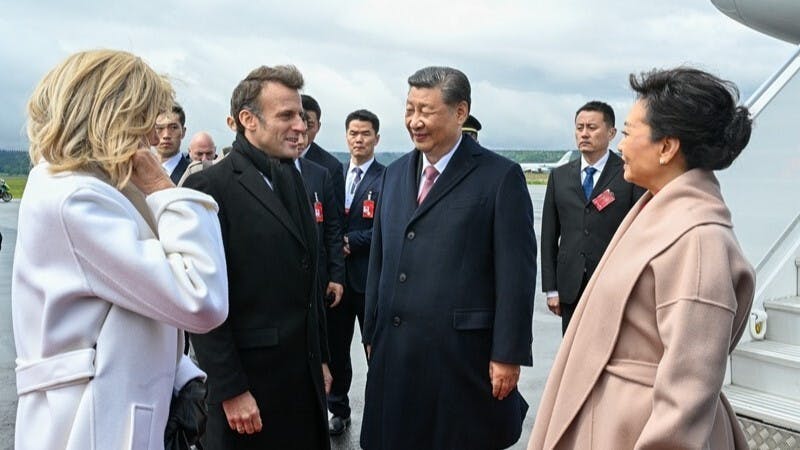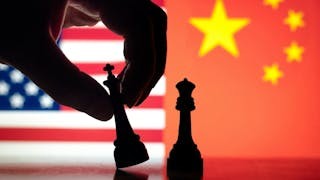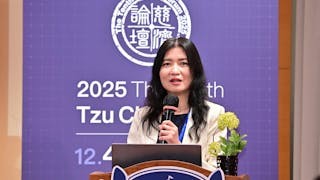中國國家主席習近平對法國、塞爾維亞和匈牙利的訪問,可以被視為中國落實推動世界走向多極化,而不是美國主導和霸權下單極世界的外交政策新舉措。然而,當前世界可以說仍然是單極的,因為美國的軍費開支在所有國家中名列前茅。除非廣泛運用外交手段來最大限度地減少各國之間的意識形態分歧和相互之間的誤解,否則多極化的發展可能會將世界推向不確定和不穩定。
2023年9月,中國外交部長王毅在莫斯科會見俄羅斯外交部長拉夫羅夫時表示,中俄兩國堅持獨立自主的外交政策,不針對第三者。王毅補充說,兩國應堅持「真正的多邊主義」,推動世界「多極化」進程,推動全球治理朝更公平合理的方向向前發展。他闡述說,面對單邊行徑、霸權主義和陣營對抗,中俄都應展現大國擔當,履行國際義務。
顯然,王毅指的是美國霸權和以美國為首的全球盟友,強調中俄也能成為多極世界的大國,至少該有三個大國相互制衡、引領世界。
習近平:多極世界帶來進步、穩定、和平與民主
中國駐肯尼亞大使周平劍撰文稱,2023年12月27日至28日,中央外事工作會議在北京召開。 他表示,習近平主席在大會上發表講話,他指出,針對當今世界面臨的一系列重大問題重大挑戰,中國需要構建人類命運共同體。最重要的是,一個平等的多極世界將帶來國際政治的共同進步、穩定、和平與民主。
2024年1月,《人民日報》發表了中國國家主席習近平關於世界多極化的演講。文章提到習主席2017年在瑞士的演講,強調經濟全球化進程中,平等、尊重和包容的重要性,中國提出的一帶一路倡議,對鼓勵各國各層級的社會經濟、文化和技術交流的重要意義,以及建立多極世界的必要性,「國家不分大小、強弱、貧富,都是國際社會平等成員,理應平等參與決策、享受權利、履行義務」。
作為全球南方國家,中國主張所有發展中國家命運共同體,維護自身利益,在全球事務中發揮代表性和發言權。習近平主席表示,中國倡議的是一個「反對霸權主義和強權政治」、推動「國際關係民主化」的公平多極世界。
2024年2月,中國外交部長王毅在慕尼黑安全會議期間會見法國外交部長塞茹爾內,表示兩國除了要加強戰略對話、相互合作和人文交流外,共同致力於塑造一個和平穩定、平等有序的多極世界格局。
習近平主席5月7日出訪法國時表示,中法應共同防止新冷戰或陣營對抗,加強各層面合作,包括氣候變化、人工智能治理、國際金融體系改革、中東危機、綠色能源、生物多樣性和海洋治理及農業發展。中法之間達成了20餘項協議。
習近平主席在會見法國總統馬克龍和歐盟委員會主席馮德萊恩時呼籲,中國和歐洲需要為世界多極化的和平與安全做出貢獻。 習近平也反駁了「中國產能過剩」的說法,暗示美國在世界和歐洲造成了這種「誤解」。
鑑於法國傳統上獨立的外交政策,中國顯然希望從美國領導的盟友中,爭取法國的支持,同時對塞爾維亞和匈牙利等其他更獨立的國家進行統戰工作,使歐盟更加「獨立」。
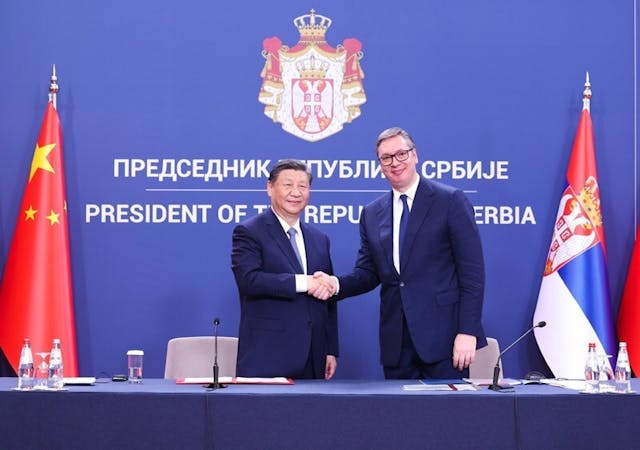
塞爾維亞之行 一種善意姿態
習近平主席此次塞爾維亞之行具有重要的象徵意義和實質外交意義。具有象徵意義的是,塞爾維亞是1999年北約轟炸中國駐貝爾格萊德大使館的國家,但習近平這次故意跳過了1999年北約轟炸現場的訪問。 如果中國政治非常重視面子問題,那麼習近平的舉動,就是在不刺激美國及其盟友心理的情況下給北約面子──這是一種善意和中國的慷慨姿態,儘管許多西方國家將中國視為「威脅」。
塞爾維亞在歷史上是成功抵抗法西斯主義和游擊戰爭的象徵,因為鐵托領導下的前南斯拉夫以社會主義和不結盟運動為特徵,這一歷史發展可與共產主義中國游擊隊成功抵抗日本帝國主義勢力的歷史發展相媲美。從意識形態來看,塞爾維亞和中國的歷史經驗有許多共同點。習近平主席訪問期間,中塞雙方達成的6點協議──中塞自由貿易協定、中方支持塞爾維亞承辦2027年專業類世博會、塞爾維亞擴大對華出口、塞爾維亞青年科學家赴華科研交流、塞爾維亞青少年赴華學習、中方歡迎塞方增開貝爾格萊德至上海直航航線,鼓勵兩國航空運輸企業開通貝爾格萊德至廣州直航航線──這是中塞關係的突破性進展。
習近平主席在最後一站匈牙利,會見了匈牙利總理歐爾班。儘管匈牙利是北約和歐盟的成員國,但匈牙利對這兩個組織的強硬立場眾所周知。顯然,習主席對匈牙利的訪問既具有象徵意義,又具有實質意義,既象徵匈牙利奉行相對獨立的外交政策,中匈雙方又實質上達成了18項協議。
2023年12月,匈牙利宣布中國的比亞迪將在南部地區開設首家歐洲電動車生產工廠,此舉標誌着比亞迪在發展中國汽車方面取得重要進展。與歐盟對中國電動車徵收關稅不同,匈牙利對中國電動車的接受程度要高得多。有趣的是,寶馬和福士(大眾)的高層警告歐盟不要對中國電動車徵收關稅,因為他們表示此舉將對依賴從中國進口汽車的汽車製造商產生負面影響。
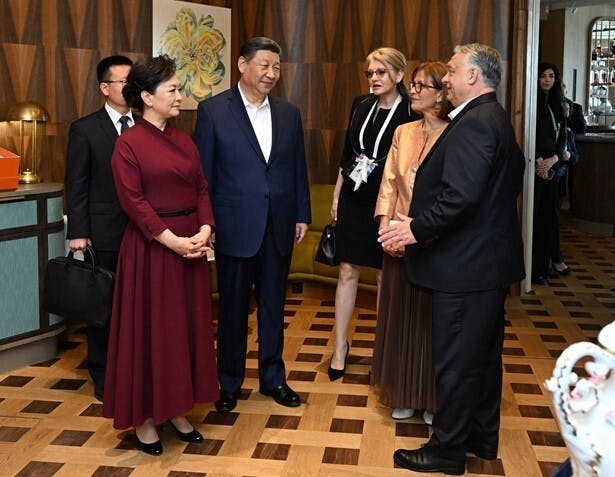
追求多極化 一個重要動機
總的來說,中國外交追求多極化有一個重要動機。其目的是針對美國及其盟國不僅將中國視為真正的軍事和經濟威脅,而且將中國的友好鄰邦俄羅斯視為必須遏制或阻止。 世界上確實存在着新冷戰思維,創造多極世界承載着抵制霸權主義、建構人類命運共同體的社會主義平等世界的意識形態。
中國建構多極世界外交的特徵是與包括俄羅斯、南半球國家在內的各國建立雙邊和多邊關係,遏制美國霸權主義。 一帶一路倡議已成為中國推行多極化外交、實現社會經濟和科技發展共贏的重要手段。
然而,從軍事上來說,當今世界仍然由美國主導。美國的軍費開支位居世界各國之首,中國瞠乎其後。儘管中國軍隊一直在改進硬體並增加開支,但其能力仍然相對未經考驗,因為自1979年中越戰爭以來,人民解放軍就沒有打過仗。嚴格來說,光靠軍費開支增加,中國並不能輕易躋身美國那樣的超級大國地位。
儘管美國的政治繼任一直採用民主機制並呈現出爭議傾向,例如特朗普的政治崛起和最近的東山再起所顯示那樣;中國的政治接班仍然具有高度的不確定性。事實上,中國的經濟和基建發展一直在大幅擴張。儘管如此,目前是否已經是多極世界還是有爭議的。如果當前世界仍然是美國軍事主導的單極世界,那麼中國走向多極世界的努力很可能會為國際社會帶來更多的不確定性和挑戰。
正如中國官方所說,推動多極化意味着「國際關係的民主化」。這種民主化意味着美國較以前更難以控制塑造世界上許多國家的外交政策,就像目前全球南方許多國家反美情緒高漲的情況一樣,特別是考慮到美國在中東危機中支持以色列。國際關係的「民主化」也意味着,世界上更多的國家在挑戰美國及其盟友的同時相互結盟,從而推動世界走向更多不確定、不穩定和緊張的道路上。
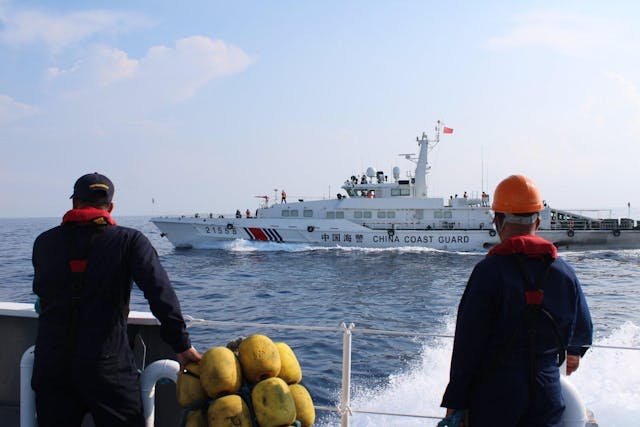
國際關係民主化 世界更加不穩定?
國際關係民主化正在助長「中國威脅」意識,因為中國的行為被視為對一些國家的威脅。最近中國和菲律賓在南海島嶼問題上的緊張局勢就是一個很好的例子。儘管菲律賓比以往任何時候都更靠攏美國,但其在主權爭端上的民族主義立場,正在使馬尼拉與北京形成危險的對立。認真地說,菲律賓統治當局並沒有對可能與中國發生衝突進行過風險評估,因為包括香港和澳門在內的華南地區,大量菲律賓傭工現在正將收入匯回給菲律賓的親人,因此他們很可能受到影響。換句話說,任何與中國圍繞南海島嶼發生的軍事衝突,都可能為菲律賓帶來意想不到的巨大經濟損失。
多極世界也周期性地將內部政治發展與外部外交政策混合在一起。美國對內是多元化和民主的,但對外是霸權主義的;中國則是對內家長式作風,但對外卻更加「民主」,正如北京強調國際關係的「民主化」一樣。
中美內外政策衝突不斷加深,相互不信任、政治對立、意識形態對抗、跨界互動等等。中國認為美國對台灣的支持在政治上是不可接受的,而華盛頓及其盟友則認為台灣是一個民主國家,其安全、生存和穩定必須得到捍衛。美國最近對中國處理香港問題的批評也被北京視為對其內政的干涉。如果在多極世界中,國內政治和外部外交政策日益交織在一起,那麼國際關係就會愈來愈多爭議,容易發生對抗和衝突。
總而言之,中國最近對多極世界的追求可以被解讀為中國社會主義和平等主義努力的標誌,旨在創造一個沒有霸權主義和單邊主義的公平世界,而是一個以和平、安全、秩序、繁榮和多邊主義為特徵的世界。然而,國際關係的民主化已經對美國及其盟國的經濟、軍事、意識形態政治利益構成挑戰,從而引發了條件反射式結盟的強烈反應,以及加深「中國威脅」的「誤解」。儘管有創造一個和平、安全與穩定的世界的良好願望,但從理論上和實踐上看,國際關係民主化正在為世界帶來更多的政治不確定性、更多的經濟和領土爭端,以及更多的軍事衝突可能性,這主要是國內政治發展與外交政策的交織性日益突顯,意識形態爭議、經濟衝突、外交的要求日益突出。 或許,只有外交對話和外交技巧,才能成為國家間爭鬥不斷的世界帶來平靜、理性、穩定與和平的不可或缺的因素。
China’s diplomatic quest for a Multipolar World
The visit of the Chinese President Xi Jinping to France, Serbia and Hungary could be seen as a new move by China to implement its foreign policy of pushing the world to multipolarity rather than a unipolar world under the US dominance and hegemony. Nevertheless, the current world arguably remains unipolar as the US military spending is the top among all countries. The drive to multipolarity will likely propel the world toward uncertainties and instability unless diplomacy is extensively deployed to minimize the ideological differences and mutual misperceptions among various countries.
In September 2023, when the Chinese Foreign Minister Wang Yi met the Russian Foreign Minister Sergei Lavrov in Moscow, Wang said that China and Russia adhered to independent foreign policies and that they do not target third parties. Wang added that both countries should uphold “genuine multilateralism,” promote “multipolarity” in the world, and improve global governance in a more fair and equitable way (Global Times, September 19, 2023). He elaborated that, in the face of unilateralism, hegemonism and confrontational blocs, both China and Russia should show their roles as “major powers” with international obligations.
Obviously, Wang was referring to the US hegemony and the US-led allies in the world, emphasizing how China and Russia can and will be major powers in the multipolar world with at least three main powers balancing each other and leading the world.
On December 27 and 28, 2023, the Central Conference on Work Relating to Foreign Affairs was held in Beijing, according to an article by the Chinese Ambassador to Kenya, Zhou Pingjian (see the website of the Chinese Foreign Ministry, www.mfa.gov.cn, January 5, 2024). He said that President Xi had delivered a speech in the conference, and that the president mentioned the need for China to build a community with a shared future for the mankind in the era of turbulence and transformation. Most importantly, an equal and a multipolar world would bring about mutual progress, stability, peace, and democracy in international politics.
In January 2024, the People’s Daily published a speech delivered by the Chinese President Xi Jinping on multipolarity (Xinhua, January 19, 2024). The article referred to President Xi’s speech in 2017 in Switzerland, emphasizing the importance of being tolerant in the process of economic globalization, the significance of China’s Belt and Road Initiative that encourages socio-economic, cultural and technological exchanges among countries at all levels, and the necessity of creating a multipolar world where “countries, regardless of their size, strength, rich or poor, should be fair members of the society with equal rights to participate in decision making and to implement their obligations.”
As a country in the Global South, China advocates the need for all developing nations to share their destiny, to protect their interests and to have representative roles and voice in global affairs. What China advocates, according to President Xi, is a fair and multipolar world in which “hegemonism and authoritarian politics are opposed” while the “democratization of international relations” is propelled forward.
In February 2024, Chinese Foreign Minister Wang Yi met the French Foreign Minister Stephane Sejourne during the Munich Security Conference, and he said that both countries should join hands to build a multipolar world, apart from the need to strengthen strategic dialogue, mutual cooperation and people-to-people exchange (China Daily, February 18, 2024).
During the most recent trip of President Xi to France on May 7, he said that both China and France should avoid the resurgence of a new Cold War while strengthening cooperation at all levels, including climate change, Artificial Intelligence governance, monetary and financial reforms, the Middle East crises, green development, biodiversity and ocean governance, and agricultural development. Some twenty agreements were reached between China and France.
When President Xi met the French President Emmanuel Macron and European Commission President Ursula von der Leyen, he appealed to the need for China and Europe to contribute to peace and security in a world that is moving toward multipolarity. President Xi also refuted the argument that China had “excessive industrial capacity” – an implication that the US had produced such a “misperception” in the world and Europe.
Given France’s traditionally independent foreign policy, China clearly hopes to woo the support of France away from the US-led alliance, while conducting united front work on other more independent countries like Serbia and Hungary to make the European Union more “independent” of the influence from US and its allies.
President Xi’s trip to Serbia had important symbolic and substantial significance, diplomatically speaking. Symbolically, Serbia was a country where NATO bombed the Chinese embassy in Belgrade in 1999, but President Xi this time deliberately skipped the visit to the site of the 1999 NATO bombing. If Chinese politics attach great importance to the question of face, President Xi’s move was to give face to NATO without stimulating the psyche of the US and its allies – a gesture of goodwill and Chinese generosity even though many Western countries see China as a “threat.”
Serbia was historically symbolic of the successful resistance and guerrilla war against fascism, for its former Yugoslavia under Tito was characterized by socialism and non-alignment movement – a historical development comparable to Communist China where its guerillas succeeded in resisting the Japanese imperial forces. Ideologically speaking, Serbia and China had much in common in their historical experiences. The six-point agreement reached between China and Serbia during President Xi’s visit – free trade, Serbia’s 2027 EXPO collaboration with China, Serbian exports to China, scientific exchanges, youth exchanges, and aviation cooperation as well as air links – is a breakthrough in Sino-Serbian relations.
During President Xi’s last stop in Hungary, he met Prime Minister Viktor Orban who is reputable for his tough stance on the NATO and the European Union, although Hungary is a member of both organizations. Clearly, President Xi’s visit to Hungary was both symbolic and substantial, symbolic of the fact that Hungary adopts a relatively independent foreign policy and substantial in that both China and Hungary reach eighteen agreements.
In December 2023, Hungary announced that China’s BYD would open its first European Electronic Vehicles (EVs) production factory in the southern region – a move that marked the important inroads made by BYD in China’s automobile development. Unlike the European Union that imposes duties on EVs from China, Hungary is far more receptive to the Chinese EVs. Interestingly, top executives at BMW and Volkswagen warned against EU imposition of duties on Chinese EVs, because they said the move would be detrimental to automakers that import cars made in China (Reuters, May 8, 2024).
Overall, China’s diplomatic quest for multipolarity has a major motive. It aims at countering the US hegemony at a time when the US and its allies are not only seeing China as a real “military” and “economic” threat, but also regarding China’s ally, namely Russia, as a country that must be either “contained” or “checked.” A new Cold War mentality does persist in the world, and as such, creating a multipolar world carries the ideology of resisting hegemonism and generating a world of socialist equality characterized by “the common destiny of the mankind.”
The Chinese diplomacy of building up a multipolar world is characterized by building up bilateral and multilateral relations with various countries, including Russia and the Global South, to check the US hegemonism. The Belt and Road Initiative has become a means by which China pursues the diplomacy of multipolarity, trying to achieve a win-win situation in terms of socio-economic and technological development.
However, the current world is still dominated by the US, militarily speaking. The US military spending tops all the countries in the world, followed by China. Even though the Chinese military has been improving its hardware and increasing its spending, their capabilities remain relatively untested because the People’s Liberation Army has not fought a war since the Sino-Vietnamese war in 1979. The increases in military expenditure alone cannot easily China up to the superpower status as with the US, from a critical perspective.
Although US succession politics have been adopting democratic mechanisms and showing contentious tendencies, as shown in Donald Trump’s political emergence and recent resurgence, succession politics in China remains to be characterized by a high degree of uncertainties. Indeed, China’s economy and infrastructure development have been expanding tremendously. Still, it is debatable whether the world at present is already multipolar. If the current world remains unipolar dominated by the US militarily, then the Chinese drive toward a multipolar world is likely generating more uncertainties and challenges to the international world.
The drive toward multipolarity means, as the Chinese have officially argued, the “democratization of international relations.” Such democratization means that the US is finding it more difficult than before to control and shape the foreign policies of many countries in the world, like the current situation in which anti-US sentiment is running high among many countries in the Global South, especially in view of the US support of Israel in the Middle East crises. “Democratization” in international relations also means that more countries in the world are challenging the US and its allies, while forming coalitions among themselves, thereby propelling the world toward the path of more uncertainties, instability, and tensions.
Democratization of international relation is fostering a strong sense of the perception of the “China threat,” because the Chinese actions are seen as a menace to some countries. The recent tensions between China and the Philippines over the islands in the South China Sea is a good example showing this perception. While the Philippines has been drifting closer to the US than ever before, its nationalist stance over the sovereignty dispute is pitting Manila against Beijing dangerously. From a critical perspective, the ruling elites in the Philippines have failed to conduct a risk assessment of a possible conflict with China, for the sizable Filipino workers in the South China region, including Hong Kong and Macau, would be affected as they are now remitting their earnings back to their relatives in the Philippines. In other words, any military conflict with China over the islands in the South China Sea would likely bring about unanticipated and immense economic costs to the Philippines.
A multipolar world is also mixing up internal political development with external foreign policies in a cyclical manner. While the US is internally pluralistic and democratic but externally hegemonic, China is domestic paternalistic but externally more “democratic,” as Beijing has emphasized the “democratization” of international relations.
The contradictions between domestic and external policies between China and the US are deepening their perceptions and misperceptions, mutual distrust, political antagonism, ideological confrontations, and cross-border interactions. The US support of Taiwan is seen by China as politically unacceptable, while Washington and its allies see Taiwan as a democracy whose security, survival and stability must be defended. The recent US criticism of China’s handling of Hong Kong has also been regarded by Beijing as an interference with its domestic affairs. If domestic politics and external foreign policies are increasingly intertwined in the multipolar world, then international relations will increasingly be controversial and vulnerable to confrontations and conflicts.
In conclusion, China’s recent quest for a multipolar world can be interpreted as a sign of its socialist and egalitarian drive toward the creation of a fair world without hegemonism and unilateralism, but a world characterized by peace, security, order, prosperity, and multilateralism. Yet, the democratization of international relations has already challenged the economic, military, ideo-political interests of the US and its allies, thereby creating a backlash of reactive alliance-building and a deepening “misperception” of “the China threat.” Despite the good intention of creating a world of peace, security and stability, theoretically and practically the democratization of international relations is generating more political uncertainties, more economic and territorial disputes, and more vulnerabilities to military conflicts in the world, mainly because the intertwined nature of domestic political development and foreign policies is increasingly prominent, ideologically contentious, economically conflict-ridden and diplomatically demanding. Perhaps only diplomatic dialogue and finesse constitute an indispensable ingredient that can and will bring about calmness, rationality, stability, and peace in the world of ceaseless power struggles among various countries.
原刊於澳門新聞通訊社(MNA)網站,本社獲作者授權轉載。原文網址:https://tinyurl.com/husbthxf



